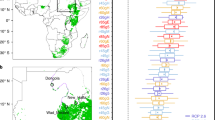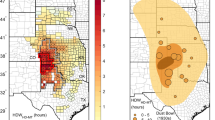Abstract
PROF. BRYAN'S reminder of my work of twelve years ago upon the yield of wheat in the eastern counties of England comes at an opportune moment. It may be of interest to recall how the “theory”, to which he refers, arose. In considering the figures for the yield of wheat for England in the twenty-one years 1884 to 1904, I had noted that they were so closely related to the rainfall of the “principal wheat-producing districts” (approximately the part of Britain east of a line from Portland to Inverness) for the previous autumn that one might almost rely upon losing a bushel and a quarter per acre from the crop for every inch of rain recorded for the region in the previous autumn. There were some exceptional years, and in the hope of getting something still more amenable to rule I restricted the area to the counties of the meteorological district “England East,” and took out the figures for wheat from the returns of the Board of Agriculture and for rainfall from the Weekly Weather Report. From these it appeared that every inch of rain, in the autumn meant a loss of 2.2 bushels of wheat per acre for the eastern counties, but the occasional exceptions were not less pronounced than for the wider area, but more so.
This is a preview of subscription content, access via your institution
Access options
Subscribe to this journal
Receive 51 print issues and online access
$199.00 per year
only $3.90 per issue
Buy this article
- Purchase on Springer Link
- Instant access to full article PDF
Prices may be subject to local taxes which are calculated during checkout
Similar content being viewed by others
Rights and permissions
About this article
Cite this article
SHAW, N. Meteorology and Wheat Shortage. Nature 98, 369–370 (1917). https://doi.org/10.1038/098369b0
Issue Date:
DOI: https://doi.org/10.1038/098369b0
Comments
By submitting a comment you agree to abide by our Terms and Community Guidelines. If you find something abusive or that does not comply with our terms or guidelines please flag it as inappropriate.



